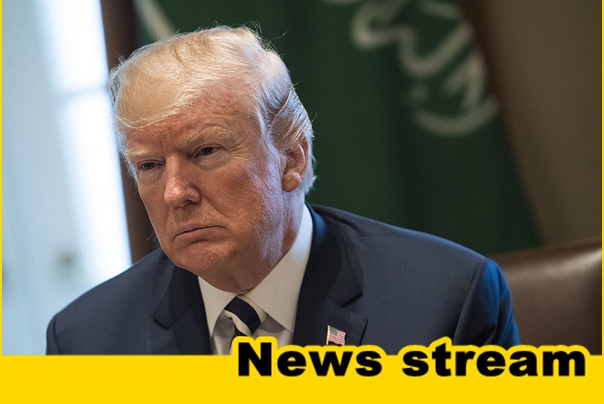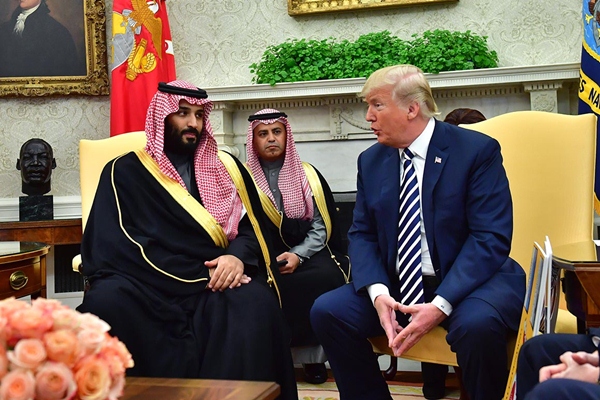
Saudi Arabia is once again a radioactive political football in the U.S., and President Donald Trump can’t resist grabbing it.
In a series of tweets this weekend, Trump indicated that Iran is behind the recent attack on Saudi oil facilities and that the United States will respond after hearing from the Saudi government “under what terms we would proceed.”
His implication — that the royal family in Riyadh will dictate U.S. actions — prompted fury in Washington, where the Saudis have faced an increasingly hostile climate in recent years, especially in Congress and even among some of Trump’s fellow Republicans.
“Trump awaits instructions from his Saudi masters. Having our country act as Saudi Arabia’s bitch is not ‘America First,’” Rep. Tulsi Gabbard of Hawaii, who is running for the Democratic nomination for president, tweeted on Sunday night.
Michigan Rep. Justin Amash, a Republican-turned-independent, noted that Congress is the body empowered to “commence war.” “We don’t take orders from foreign powers,“ he tweeted.
Secretary of State Mike Pompeo explicitly blamed Iran for the strike on the oil facilities, which belong to Saudi Aramco, the state-owned petroleum giant. “Iran has now launched an unprecedented attack on the world’s energy supply,” Pompeo tweeted within hours of Saturday’s attack.
Saudi officials were not willing to go as far as Trump aides and directly blame Tehran for the damage to their facilities, although they did say they believe Iranian weapons were used. „Investigations are still ongoing to determine the source of the attack,“ the Saudi Foreign Ministry said in a statement.
On Monday afternoon, Trump said that while it is „looking“ like Iran was behind the attack, he noted that an investigation is ongoing. He also said he’d like to avoid war with Iran, but that the U.S. is ready for such a conflict.
Asked if he had pledged to protect the Saudis, Trump said: „No, I haven’t promised the Saudis that … We have to sit down with the Saudis and work something out.“
Such equivocation is unlikely to deflate the controversy around Riyadh’s role in U.S. policy.
When Trump won the presidency in 2016, few countries were as happy as Saudi Arabia. The Saudis had felt neglected and dismissed under Trump’s Democratic predecessor, Barack Obama, who had prioritized reaching out to Iran, Saudi Arabia’s regional arch-rival.
They hoped Trump would be friendlier to their interests, and in many ways, he has delivered: signing off on weapons deals, abandoning the Iran nuclear deal and downplaying the Saudi state’s human rights abuses. Trump even made Saudi Arabia the first foreign country he visited, famously posing in front of a glowing orb with Saudi royals during a conference on fighting terrorism.
But Saudi Arabia’s reputation in Washington is arguably worse now than it has been in nearly two decades — almost as politically charged as in the years immediately following the Sept. 11, 2001, attacks, when it was revealed that 15 of the 19 hijackers were Saudis.
Under the de facto leadership of Saudi Crown Prince Mohammad bin Salman, Riyadh has pressed ahead with a four-year-old war against Iran-backed Houthi rebels in Yemen, which has had catastrophic humanitarian consequences that have been sharply criticized on Capitol Hill. U.S. lawmakers backed a measure that would have ended U.S. support for that war, but Trump vetoed it.
The killing of journalist Jamal Khashoggi, a Saudi national who had been living in the U.S., also fueled a massive backlash against Riyadh, which was blamed for the murder by the U.S. intelligence community. Many U.S. lawmakers in both parties hold Bin Salman responsible for what happened to Khashoggi, who was assassinated inside the Saudi consulate in Istanbul, Turkey.
Trump has effectively said he doesn’t care if the Saudi crown prince played a role because Saudi Arabia is an important ally, one that buys a lot of U.S. weapons and is a key global oil producer. „It could very well be that the Crown Prince had knowledge of this tragic event — maybe he did and maybe he didn’t!“ Trump said in one lengthy statement on the matter.
Analysts said the latest crisis exposed a major conundrum in Trump’s foreign policy: The president and his aides have sent conflicting signals on what, if anything, the U.S. will do to defend its Arab allies in the Middle East when it comes to Iran.

That confusion was apparent earlier this year following a series of bomb attacks on oil tankers in the Persian Gulf that U.S. officials blamed on Iran. Then-national security adviser John Bolton, for example, warned Iran that “any attack on United States interests or on those of our allies will be met with unrelenting force.”
Trump almost launched a military strike on Iran as the crisis over the oil tankers heated up and Iran downed a U.S. drone; but he called it off at the last moment, saying it would have been a disproportionate response. The U.S. later downed an Iranian drone.
Left unclear has been what the Trump team considers a U.S. interest. And adding to the murkiness is Iran’s use of proxy forces and territory outside its borders to launch attacks, while its Islamist leaders in Tehran officially deny any role.
Does Trump consider “actions by Iran against American allies to be actions that either demand or require some sort of U.S. response?” asked Jon Alterman of the Center for Strategic and International Studies. If he does, “you not only enmesh the U.S. in endless wars, but you reward the countries in the region for risky behavior because the U.S. comes in and acts.”
The Houthi rebels have claimed responsibility for the weekend attacks on the oil facilities, but Pompeo has said there’s no evidence the attack originated in Yemen, and the Wall Street Journal reported that U.S. officials believe Iran itself may have been „the staging ground.“
There’s little love for Iran in Washington. The country has been a stalwart enemy of the United States since its Islamic Revolution 40 years ago. Iranian leaders have refused offers by Trump to hold talks, including possibly during the United Nations General Assembly later this month.
„Neither is such a plan on our agenda nor will such a thing happen. This meeting will not be held,“ Iranian Foreign Ministry Spokesman Seyed Abbas Mousavi said, Iran’s state-run Fars News outlet reported Monday.
Despite Iran’s hostility, critics argue that Iran’s latest alleged misbehavior is partly Trump’s fault because he quit the Iran nuclear deal and re-imposed economic sanctions on Tehran.
„The administration’s response to a crisis it caused by walking away from the [Iran deal] has been completely incompetent,“ Ilan Goldenberg, who served in the Obama administration, tweeted. „It has failed to build an [international] coalition, failed to make a credible public case, given Iran more flexibility to hit our partners & increased the risk of war.“
Under Bin Salman, Saudi Arabia repeatedly has been accused of risky behavior. Sen. Chris Murphy, a Connecticut Democrat trying to end the U.S. role in the war on Yemen, has blasted Riyadh for its all-too-frequent bombings of civilian targets, for instance.
And there are concerns that Bin Salman’s use of power in Riyadh, including his imprisonment of human rights activists and sidelining of other royals, signals that he will serve as a brutal dictator once he officially takes over from his father, King Salman. Even Sen. Lindsey Graham, a South Carolina Republican aligned with Trump, has called bin Salman a „wrecking ball.“ Given that Bin Salman is in his 30s, he could rule for decades.
Saudi Arabia has spent billions of dollars on U.S. weaponry over the years, raising questions about why it would need U.S. support were it to decide to retaliate against Iran.
„Direct engagement by U.S. military in response to Iran’s attacks on Saudi oil infrastructure would be a grave mistake,“ Sen. Mitt Romney (R-Utah) tweeted on Monday. „The U.S. has continued arms sales so Saudi Arabia can defend itself. If S.A. responds against Iran attacks, the U.S. should be ready to support in a non-kinetic role.“
In its statement Monday, the Saudi Foreign Ministry called for an internationally supported investigation into the oil facility attacks. The kingdom also insisted that it „has the capability and resolve to defend its land and people, and to forcefully respond to these aggressions.“
A well-connected Saudi observer, however, said Riyadh’s hands are tied in part because U.S. forces are in the region.
Several hundred U.S. troops have been deployed to Saudi Arabia itself as part of a bigger build-up of the U.S. presence in the Middle East following the oil tanker attacks.
“Saudi cannot attack Iran without a U.S. ‘OK’ since the U.S. forces will be exposed to reprisals,” the observer said in a written message to POLITICO, adding that it’s “similar to [the] risk Israelis would have taken if they attacked Iran without coordinating with [the] U.S.
“So ultimately, [the] cards are in the hand of the U.S. and Trump.”
There’s one person who would have taken exception to that in the past.
“Saudi Arabia should fight their own wars, which they won’t, or pay us an absolute fortune to protect them and their great wealth-$ trillion!” Trump tweeted in 2014, a year before he announced he was running for president.
By NAHAL TOOSI
Source: politico.com
See more here: news365.stream





